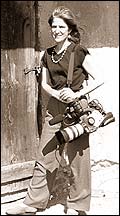Former Clevelander chases family demons in new
film

"I knew that the
film would open us up to one another."
- Marcia
Rock, filmmaker |
By MARILYN H. KARFELD
Staff Reporter
This week, Shaker Heights resident Manny Rock will finally get to
watch "Dancing with My Father," his daughter's intimate documentary
about her family, her marriage and their relationship.
He's going to be pleased.
Despite its analytical and sometimes critical tone, "Dancing With
My Father" is above all a daughter's expression of love for the
first man in her life. After probing, often painful interviews, New
York filmmaker Marsha Rock concludes that her father erected a wall
to protect himself, not to shut out his children.
Rock's brother, Howard, supported the making of the film from the
beginning. But her sister, Elaine Gluck of Pepper Pike, thought it
would not only put the underside of their family's life on display,
but also would hurt their father.
While admitting she never really knew her father before she began
the project, Rock says, "I knew that the film would open us up to
one another."
As the filming of "Dancing" progressed, Gluck agreed the
documentary changed the family dynamics and for the better. "One day
Elaine called me up and said, 'I'm so glad you did this. I waited 54
years to hear Dad say, 'I love you,'" Rock says.
Being so open about her shattered marriage and her family demons
was the only way "that people will believe me or identify with me,"
says Rock, who directs the broadcast journalism program at New York
University. "Only through honesty could I bring my family
along."
This month she presented "Dancing" at a psychotherapy symposium
in Washington, D.C., and she expects to distribute the film to
colleges and universities.
Several of Rock's previous documentaries, including "McSorley's
New York," which won an Emmy, have chronicled the Irish in Northern
Ireland and as immigrants in New York. "I was adopted by the Irish,"
she says. "I got to know them better than my own Jewish background."
Her latest documentary rekindled her interest in her own
heritage.
Visiting the Woodland Ave. neighborhood, her father's childhood
synagogue, which is now a church, and the scrap steel business
started by her grandfather, Rock began to feel far more connected to
the Jewish people and her past.
"My father made me go to Cleveland Hebrew Schools four days a
week," says Rock, who was confirmed at Park Synagogue. While she
loved the songs, the traditional way of teaching the Chumash (Five
Books of Moses), which focused solely on translation, held no
interest for her. "I hated it."
But when she visited the tiny Slovakian village where her
grandmother was one of only a few Jews among 300 Catholics, Rock
says she identified with the struggle Jews have had, living as
outsiders.
Today there are few signs that Jews once lived in the Eastern
European village. "It hurt me so profoundly," says Rock. "I had all
this renewed respect for the trauma of the immigrant experience and
how they survived, how they held their culture together."








